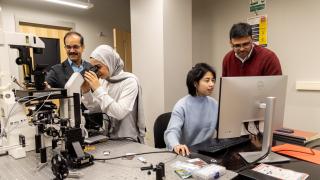
Announcements
Winter Cycle Competitive Campus Grants Now Accepting Applications
The winter cycle of Competitive Campus Grants is now open for applications, with submission deadline Thursday, February 15th, 5:00 pm. The Competitive Campus Grants below are available to all UM-Dearborn tenured/tenure-track faculty.
- Research Initiation & Development (RID) Grants aim to assist faculty and research staff with the development of innovative, collaborative research proposals that will advance the UM-Dearborn mission. The program supports proposals which will help place the principal investigator (PI) and the research team in a strong position to receive additional, external funding from federal agencies, foundations, and/or industry.
Budget floor: $10,000; Budget ceiling: $20,000 - UM-Dearborn Scholars (SCH) Grants are intended to support research, scholarship and creative activities in the arts. This program is intended for projects with funding needs not usually addressed by other support programs within or outside the University.
Budget floor: $6,000; Budget ceiling: $10,000. - Thematic Research Planning (TRP) Grants are open to teams working closely together to solve problems that transcend the traditional boundaries associated with research programs, departments and colleges. Single PI proposals will *not* be considered- at least two different UM-Dearborn academic units should be involved, in addition to external partners. The aim of the program is to provide support for the development of competitive proposals to preliminary identified (by the team) external funding opportunities.
Budget floor: $15,000; Budget ceiling: $30,000.
More information about the campus grants programs including eligibility, previously funded projects and frequently asked questions can be found on our Campus Grants webpage. For additional questions, please email [email protected].
Research Data Stewardship Policy Took Effect January 1, 2024
A new U-M policy that sets expectations and guidance for the stewardship of research data, focusing on issues of ownership, sharing and retention, took effect on January 1, 2024.
The SPG, developed as part of the Research Data Stewardship Initiative, with extensive input from a wide range of faculty and staff groups, outlines how storage and access to data generated by U-M researchers should be administered. The new policy also outlines expectations for U-M researchers to make research data publicly available when possible, taking into account any existing agreements, contracts, sensitivities or protections. Review the research data stewardship policy here.
Upcoming Deadline for IRWG Grant Programs
Applications for two grant programs from the Institute for Research on Women & Gender are due February 7:
- Joan Schafer Research Faculty Award in Sport, Fitness, and Disability
Established in 2015, this program supports U-M faculty projects investigating how living with any type of disability influences access to, and participation in, sport and physical activity. Projects that have real world application through interventions in public health or clinic-based settings are a top funding priority. - IRWG Faculty Seed Grant: Open Topic
This grant program supports disciplinary and interdisciplinary faculty projects on women, gender, and sexuality. Funds may be requested for individual activities, such as research assistance, research-related travel, or research materials, or for collaborative projects, such as pilot studies. While providing funds for new and emerging work is a priority for this program, requests to add a gender component to an ongoing research project may also be considered.
Research Grants on Preventing & Alleviating Poverty
Poverty Solutions invites faculty at U-M's Ann Arbor, Dearborn, and Flint campuses to pursue research projects that can inform existing policies, practices, or interventions meant to prevent or reduce poverty or research that lays out proposals for future policy directions. Junior faculty are encouraged to apply, and partnerships with faculty across multiple campuses are strongly encouraged.
Poverty Solutions will award up to five grants of $20,000 each on a rolling basis; there is no set deadline to apply for the funding. See the RFP for guidelines and application instructions. Questions can be directed to [email protected].
NSF Mid-Career Advancement (MCA) Program
The NSF Mid-Career Advancement (MCA) program supports eligible mid-career scientists and engineers to substantively enhance and advance their research program and career trajectory. It provides support for protected time, resources, and the means to gain new skills through synergistic and mutually beneficial partnerships. The current application window is February 1, 2024 - March 1, 2024; proposals will be accepted each February 1 - March 1 annually thereafter.
MCA program synopsis: “The MCA offers an opportunity for scientists and engineers at the mid-career stage to substantively enhance and advance their research program and career trajectory. MCA support is expected to help lift constraints to reduce workload inequities and enable a more diverse scientific workforce (more women, persons with disabilities, and individuals from groups that have been underrepresented) at high academic ranks.
Participating programs in the Directorates for Biological Sciences (BIO), Geosciences (GEO), Social, Behavioral and Economic Sciences (SBE), Education and Human Resources (EHR), and Technology, Innovation and Partnerships (TIP) will accept MCA proposals. To help identify the disciplinary program in which the MCA should be reviewed, PIs are urged to investigate the research areas supported by the different directorates and participating programs. View the NSF MCA Contact list.
Read about the three key objectives of the solicitation, plus tips for successful proposals in the NSF 101 for the Mid-Career Advancement program. As a reminder, there are also many Research Development resources available through the Office of Research when preparing a proposal.
Mardigian Library Support for Data Management Plans
Data management plan support available from the UM-Dearborn Mardigian Library. Data management planning is often required by funders in the form of a document called a Data Management Plan (DMP) that will describe the handling (collection, storage and archiving) of data collected during your project. A DMP may also need to include plans for the dissemination of your data, (sometimes referred to separately as a Data Sharing Plan). To help faculty navigate data management planning, the UM-Dearborn Mardigian Library offers both a subject guide on Research Data Management as well as a DMP review service.
The UM-Dearborn Mardigian Library’s Research Data Management subject guide covers definitions, online tools for creating a DMP, guidance from ICPSR, example plans and more. Read the Research Data Management subject guide to learn more about DMPs.
UM-Dearborn librarians are also available to help answer questions and offer support to faculty improving their DMPs as a part of their DMP review service. To contact a librarian for a DMP review, fill in their DMP review request form.
Reminder: Resources for Using SciENcv
Effective October 23, 2023 NSF requires all biosketch and current & pending support documents for senior personnel to be prepared using SciENcv. The fillable pdf forms are no longer accepted. We recommend that you take the time to register with ScieENcv and begin to create your documents in that system if you expect to be involved in a proposal to NSF in the near future.
U-M Library Services has put together this guidance page to help you get started. You can also request a one-on-one Zoom session with Dearborn Office of Research staff to walk you through this process. Science Experts Network Curriculum Vitae (SciENcv) is a researcher profile system for all individuals who apply for, receive or are associated with research investments from federal agencies. SciENcv allows researchers to document their education, employment, research activities, publications, honors, research grants, & other professional contributions to create multiple SciENcv profiles in official biographical sketch formats funding agencies such as the National Institutes of Health (NIH), the National Science Foundation (NSF), and the Institute of Education Sciences (IES). In addition, the SciENcv application can be used to create the official NSF Current and Pending Support document.
Any researcher can register for SciENcv and create multiple biosketches, for different research projects or different funding agencies. You can find much more information about how to use SciENcv on their FAQs page. The central Office of Research and Sponsored Programs and U-M Library have resources and previous workshops available on how to create a biosketch in SciENcv specifically focused on NSF and NIH. These resources are available linked below:
- U-M Library SciENcv Guide (including step-by-steps for creating NSF and NIH biosketches)
- NSF Biosketch and SciENcv Webinar (July 2020)
- Slide Deck (MLibrary Presentation)
- NSF Biosketch Webinar Transcript
- How to Create Your NSF Biosketch in SciENcv Step-by-step (MLibrary Handout)
- NIH Biosketch and SciENcv Webinar (May 2020)
- Slide Deck (MLibrary Presentation)
- NIH Biosketch Webinar Transcript
- Biosketch and SciENcv Step-by-Step (MLibrary Handout)
If you have questions about SciENcv, need additional support, or would like to schedule one-on-one assistance with setting up your SciENcv profile and documents, please email our office at [email protected].
Research Events in January
- Office of Research, “Arthur (Skip) Lupia Research Seminar” - Thursday, January 11th, 11AM - 12PM, in-person in 1410/1420 PEC, followed by lunch in the PEC Atrium.
- Teaching and Technology Collaborative “Generative AI Basics Workshop” - Tuesday, January 19th, 10:00 - 11:30AM, virtual
- Hanover Research, “Funding Landscape for AI & Machine Learning” - Thursday, January 25th, 12-12:45PM, virtual
- UM Library, “Digital Scholarship 101: Managing Your Data” - Thursday, January 25th, 3 - 4:30PM, virtual
The Office of Research website is also updated regularly with research-related events and announcements, so we would encourage you to bookmark our landing page and subscribe to our Research News email list.
Research Resource Highlight: Student Research Opportunities Board
Every month, the Office of Research features a resource and/or tool that is available for researchers. This month we are featuring the Student Research Opportunities Board created by Experience+.
The new Student Research Opportunities Board (SROB) is a centralized platform designed to connect students with research opportunities available at UM-Dearborn. Faculty members with research projects that would benefit from an undergraduate or graduate student can now post on the SROB. These opportunities can be:
- Paid research experiences
- For credit independent study projects
- Volunteer research positions at UM-Dearborn
- Externally funded research positions
- Curated National Scholarships and Fellowships
The SROB serves as a convenient place for all students to explore the diverse array of research projects and opportunities across all four colleges and beyond. By submitting your research opportunities to the SROB, you can directly contribute to the collective goal of providing meaningful PBL and professional development opportunities for students while advancing faculty research. To post your opportunity, use the Faculty Submissions for Student Research Opportunities Board Form.
If you have any questions or require assistance with the submission process you can contact Experience+ at [email protected].
Upcoming Funding Opportunities
The Office of Research publishes a list of selected funding opportunities, organized by college, every month on our website under Announcements. In addition, yearly grant calendars organized by subject area provided by Hanover Research are available there as well. Contact the UM-Dearborn Office of Research if you would like more information about submitting a proposal to any of the programs.



